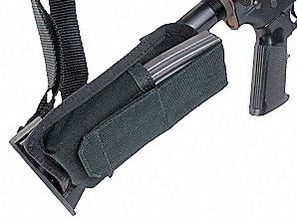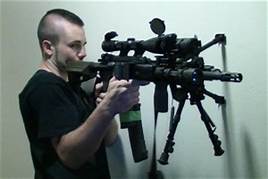Like so many questions, the answer to this one is not a simple yes or no. There are pros and cons to using a rifle for self-defense, and each person must individually assess whether the rifle is the best tool for his or her particular situation.
With this in mind, let's look at some of the arguments for and against using a rifle for self-protection.
Pro #1: Plenty of power
If we look at the stats of a typical 9MM 124-grain FMJ, we find that the muzzle velocity of a typical round is around 1100 feet per second (fps), delivering energy of around 340 foot-pounds (ft-lbs). That's plenty of punch, but it pales in comparison to an average 55-grain .223 Remington cartridge, typical in an AR-15. That round will leave the muzzle at around 3200 fps, delivering 1250 ft-lbs of energy. That's over 3 times as much punch, and is more than sufficient to deliver fight-stopping hits to an assailant.
There are ample cases of someone being shot multiple times with a 9MM or 45ACP and continuing to fight. While it's possible that someone shot a time or two with a .223 round from an AR will continue to pose a threat, it's far less likely than with a handgun.
Pro #2: Less over-penetration
Actually, and perhaps counter-intuitively, over-penetration is less of a problem with .223 than it is with a typical handgun round. The reason why is because of the lighter weight of the bullet. Because the 55-grain bullet is so much lighter than the 115- or 124-grain bullets typical of 9MM cartridges, the bullet will lose velocity much faster once it hits a solid or semi-solid object. Real-world testing has corroborated this theory, and in some tests, .223 was even less prone to over-penetration than 12-gauge buckshot. If you are concerned about over-penetration, your AR-15 is actually a better choice than your Glock 22.
This video, while not a perfect test, gives one short example of 9MM penetrating further than .223/5.56.
Pro #3: Ammunition capacity
| As an added bonus, rifles make it pretty easy to store an extra magazine on the gun itself. There are an endless array of devices that you can fasten to your rifle which allow you to keep a second magazine handy, like the one pictured here. That's a total of 60 rounds, more than you can carry with three or four typical handgun magazines. (If you can't get the job done with 60 rounds, either your marksmanship sucks, or you're in more trouble than you can handle by yourself anyway.) |
Pro #4: Easier to hit your target
In a gunfight, you will use what is known as a “flash sight picture” (assuming you have trained yourself to use the sights at all). This means you will align the sights just well enough to ensure you hit your adversary, seeing a momentary “flash” of the sights before firing the shot. With a handgun, the short sight radius means that a flash sight picture is only effective for a short distance, perhaps 5 yards or so. With a rifle, you can get away with imperfectly aligned sights as far away as 15 yards and still hit your threat.
Pro #5: Easy to control and shoot
In spite of certain Vice Presidents' assertions to the contrary, the AR-15 is much easier to shoot and control than a shotgun. This works to your advantage by enabling you to fire additional follow-up shots. It also makes training with it fun and painless.
Pro #6: Customization
This means that you can make your AR your own, in virtually every way imaginable, from butt-stock to muzzle brake, and everything in between. There is no shortage of sighting systems, attachable lights, fore-ends, grips, and stocks that allow you to make it both functional and fashionable, in your own particular taste.
So far this seems like a lot of positive aspects stacking up in favor of the home-defense AR. So what's the bad news?
Con #1: Storage considerations
Con #2: It takes two hands to operate
Con #3: Price
Con #4: Bulk
Con #5: Noise
To be fair, handguns are loud too. Firing a handgun indoors will certainly ring your bell as well. In fact, handguns and rifles are not appreciably different in terms of a straight decibel reading. However, the higher pressure wave and fuller sound spectrum of a rifle shot makes them much harder on your hearing.
This is why it's not a bad idea to keep a pair of electronic hearing protection with your home-defense gun. While there's no guarantee that you'll have the time to put them on in a critical moment, it never hurts to have the option.
Conclusion
Whichever type of gun you ultimately choose to protect your home and family, make sure you are highly proficient in its use, and well-acquainted with all considerations of self-defense shooting. Our Defensive Rifle Course will make you an expert with your rifle, guaranteed.


